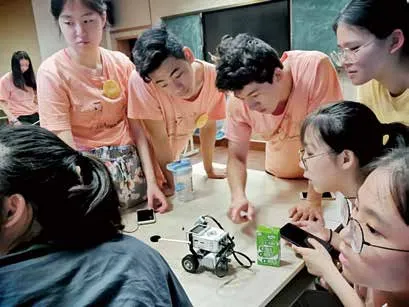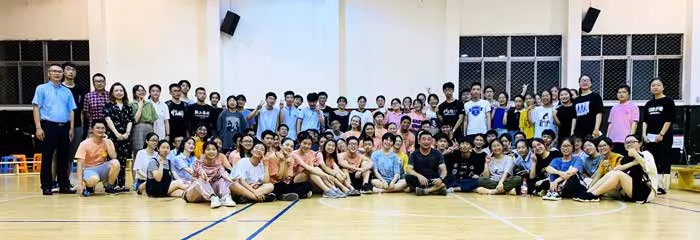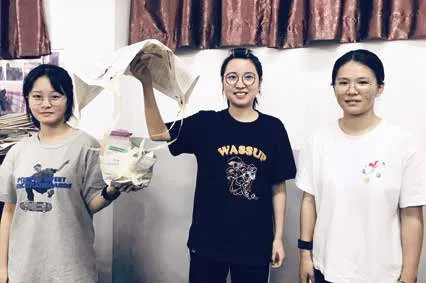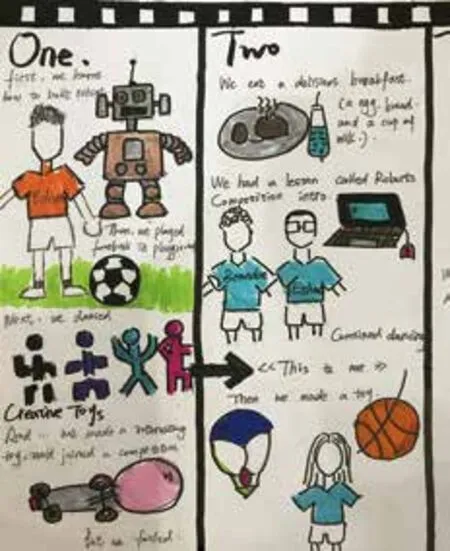华裔少年的浙江寻根之旅
● 七 里
遇见深藏在基因里的中华味道
这些美国学生都来自地处温带的美国密西根州,几乎都具有华裔血统,也都能说上一口流利的中文。虽然他们也时常跟着父母回国探亲,在家庭的交流中也使用中文,但是如此深入地了解中国、了解同胞,还是第一次。

洞头一中的学生跟着华裔少年一起学习编程、机器人课程。Students of the Dongtou No. 1 Middle School work together with their American counterparts at the summer camp to build and program robots.
酷热的夏天,38摄氏度的高温,2019国际青少年科技论坛中国行暨洞头支教夏令营开营。
这是全美浙江总商会与密西根青少年励能基金会举办的公益夏令营,除了让生于美国的华裔二代更好地了解中国文化及传统外,更多的意义在于其公益性和服务性。营里的19位美国高中生,这次在浙江的主要任务是文化交流与公益支教。
这些美国学生都来自地处温带的美国密西根州,几乎都具有华裔血统,也都能说上一口流利的中文。对于居住在温带的他们来说,这样的高温让人很不适应,但是好奇心和新鲜感让他们忽略了对高温的感知。
参观上海大众、阿里巴巴,参加校际交流、中学支教……上海、杭州、温州三地奔波,这样的夏令营线路让19位美国的高中生们像是来到了一个新世界。虽然他们也时常跟着父母回国探亲,在家庭的交流中也使用中文,但是如此深入地了解中国,了解同胞,还是第一次。
这19位少年中有两位,彬彬和骢骢,是我的外甥,我姐姐也借此从美国一路跟着回了杭州,趁机回国休假。
对美食的热爱,深藏基因里
20年前,我和在大洋彼岸的姐姐们互通音讯,至少需要1个月的时间——寄一封航空信件过去花时半月,姐姐们看完写好回信再寄来又需半月。如果只是聊些家长里短,我们会更多地选择便宜些的海邮,单程长达1个月。国际电话太贵,一分钟16元,除了急事,只有妈妈想女儿想得狠了,才会掐着时间说上那么一分钟互相听听声音。那会儿妈妈总是念叨:“这一辈子也不知道还能见上几面。”20年后,我的生于美国的外甥们每年都会回来一次,今年因为参加夏令营已经回来两次了。
当远距离的思念得以舒缓,美食便开始占据乡愁的最主要部分。从前姐姐们每次回美国,总要把箱子装满才会心满意足,里面有笋干、香菇、木耳和茶叶。现在,除了新茶,其他的都能从美国的中国超市里买到,于是对于美食的渴望便替换成了回国好好地吃香喝辣,借以摆脱左宗棠鸡、酸甜咕噜肉的阴影。
垃圾经柴油机烟气干燥后可以全部焚烧,参照城市生活垃圾焚烧成本,因工艺不同处理费用为 60~250 元 /t[20]不等,取平均值为 155 元 /t,垃圾干燥器运营成本(主要为工人工资)取32.5万元(5人计,工资5万元/人,社保30%计),折旧费取14.3万元,每年焚烧成本为:

华裔少年在上海城隍庙买南翔小笼包。The young Chinese Americans pose with a small steamer of mini-Baozi made in the Nanxiang Style at the Temple of City God in Shanghai.

在洞头渔家和当地学生用土灶生火做渔家咸饭。Some Chinese and American summer campers make and enjoy a rice meal at a fisherman's home in Dongtou.
对于美食的热爱和想念,大概是每位华裔不可摆脱的魔咒。有位向来对吃饭如同完成任务的朋友,去美国没两年,也开始在朋友圈发些自做的中餐图片,想来也对西方食物的单调有些忍无可忍。
尝过中华料理的两个外甥,在夏令营必做的一件事便是每一天向妈妈汇报今天吃了什么,并加以好吃或不好吃的评论。在上海的第一天,夏令营组织参观城隍庙,一营的人捧着著名的南翔小笼包合影,一脸的兴高采烈。营里的少年几乎都具有华裔血统,每天都对一日三餐很是期待。他们吃到了多刺的白条鱼,吃到了带骨的鸡鸭鱼肉,吃到了带浇头的面条……
在温州洞头一中支教的第一周,夏令营安排的是美式团餐,很快就按同学的要求,换成了国内的套餐。因为是在洞头支教,所以伙食就按学校的常规饮食来安排。夏令营每天的伙食和洞头的孩子们是一样的。每天的早餐是中国南方的传统早点,豆浆白粥油条大肉包,大家吃得兴高采烈。
此时,我的另一位姐姐正在纽约逛吃逛吃,每天在微信朋友圈里发些行程动态,每一条都有关中华料理的信息,比如昨天去吃了过桥米线和“西安名吃”连锁店的肉夹馍,今天又打算去曼哈顿的法拉盛中国城吃喝。
对于美食的好奇和热爱,深藏在华人的基因里。
旅行在外,我们总希望可以融入当地,哪怕是从这个城市到另一个城市;而如果能够融入另一个国家,那更是令人欣喜。出生在美国的华裔,就有着这样天然的便利和条件,从小就在中英文间切换,无论是语言还是思维。
打开一扇窗,看见彼此
年轻人间的交流,比之成年人更为纯粹与顺畅。因此夏令营每到一地,都会与当地的中学生交流切磋。在杭州,同学们与杭州高级中学、杭州源清中学、杭州江南实验学校的同学们一起组队,在50分钟内完成了Space Cube(太空盒子)挑战赛。
在温州洞头一中,说是支教,还不如说是一场持续的大型联欢和两国高中学生间的文化交流更为合适。
每天晨会,中美双方的孩子们便各自展露出拿手绝活,自高中生活圈里最流行的语言和文化,唱歌跳舞乐器演奏,一下就将双方的关系拉近了。同龄人之间总能找到许多共同的话题,尤其是对彼此双方日常生活都很好奇的这几十名孩子来说。
支教内容系统而深入,不是传授基础学科知识,而是选择了一些美国高中比较流行的课程,比如机器人竞赛基础、英语思维、趣味科学、海报设计,甚至还有户外运动课。夏令营的组织者、密西根青少年励能基金会的Grace女士负责课程设计,她说,“我们的目的在于尽可能地给当地孩子带去科技创新理念和学习思路,尽可能地让他们的思维更开阔、眼界更高远,这才是我们支教的目的。”
为了这次支教,基金会早在两个多月前便开始了课程设计和培训——上什么课?要达到什么样的教学目的?每一个队员负责什么环节?19位队员按照课程被分成几个小组,不断培训、演练。为了编程课,还从美国专门带了EV3机器人。
每一项课程在经历5天的系统学习后,最终都会被要求以完整的结果来展示。比如机器人编程课会将中方学生分成两队,各自设计一套编程,完成要求的项目,进行双方对抗;AP课程则是通过物理原理,设计出可以让装水气球从高空扔下而不破的保护伞;运动课则上演了一场足球赛;音乐剧课为最后的告别晚会排练了一场歌舞剧——《This is me》(这就是我)。

交流团合影。Chinese and American summer campers, teachers and officials pose for a group photo at the stadium of Dongtou No. 1 Middle School.
这些课程对小老师们的学识及中英文转换能力要求颇高,所以在行前,这支夏令营的19名成员都经过了严格的5选1考核才入选,每个人都有自己的专业特长和拿手项目。有的是学校机器人队的主力,有的得过美国各类科技、艺术竞赛金奖……
我的外甥骢骢所在的小组负责科学玩具设计及制作,其中一项水气球实验是这样的——往气球里灌满水,扎紧口子,然后把水气球从教学楼顶楼6楼往地面扔。要让气球不破,关键是用常见的材料比如报纸、胶水等做一个保护伞,以减缓水气球的冲击力,让它最终软着陆而不破裂。而设计需要用到物理知识和微分公式,所以骢骢首先给大家上了高等物理课。
平时流利的中文,并不代表能够在这种深度的科学课上也能应用自如,涉及学科上的专业名词,还是会有一定的沟通障碍。
在上物理课之前,为了能够顺畅地和同学们交流,骢骢在备课笔记上将所有涉及的内容都作了英中文的翻译转化,不过这样的准备在实际使用时似乎仍显不够,碰到一些学术上的词,还需要台下听课的洞头一中同学补充翻译。
不过结果都很美妙,水气球背着保护伞成功地从6楼掉下并缓缓降落在地面;机器人对抗赛在两队中方学生间展开,大家仅用了5天时间便初步掌握了编程要义;英语课则为最后的告别晚会排练了一场歌舞剧。短短5天的支教结束,美方孩子的钢琴伴唱《Remember Me》回荡在学校体育馆里时,台下倾听的许多孩子悄悄地抹开了泪。
正如夏令营组织方所说,短短5天,同学们留下的是真挚的情感和友谊,这将作为纽带,为中美学生成长起到点睛作用。
Chinese American Youngsters Feel at Home at Summer Camp in Zhejiang
By Qi Li
July 21st, 2019 saw the opening of a 6-day summer camp on Dongtou Island, Wenzhou in southeastern Zhejiang Province. The summer camp aimed to bring Chinese and American youngsters together to learn more about the local culture and lifestyle of the island. All of the American youngsters were from Michigan, USA and nineteen of them were Chinese American, whose parents were migrants who grew up in China and settled down on the other side of the Pacific Ocean. Some students from a local middle school on the island took part in the summer camp as American counterparts.They mixed well.
The summer camp was held on the campus of Dongtou First Middle School. The 6-day event was considered part of a largescale cultural exchange programs. On the first day, the campers visited a village cultural center on the island and visited a museum of shell carving, a regional folk art on Zhejiang's list of intangible cultural heritage since 2007.

一起做实验。Chinese and American summer campers do an experiment together.

洞头一中的学生每天用海报来记录一天的夏令营生活。This picture diary in English chronicles what the young Chinese and American campers do in Dongtou.
The exchange program touched on ten subjects such as robotics and advanced mathematics. The 19 Chinese Americans were both students learning something from their counterparts and teachers while sharing what they knew with their Chinese counterparts same time. After all, they had been selected from a large crowd of applicants and only one of every three was picked.
The camp on the island wasn't the whole of the summer tour. The American youngsters also visited Hangzhou and Shanghai on their summer tour in China. In Hangzhou they visited the headquarters of Alibaba, the world's number one Internet e-business, and in Shanghai they visited a Volkswagen factory and the City God Temple, one of the best tourist attractions in the city's downtown. The 19 Chinese American youngsters found the summer event fascinating and opening a new world to them, even though some of them had come back to visit their families in China many times and most of them speak Chinese with their parents at home. This trip across the ocean and across Zhejiang and Shanghai gave them an unprecedented perspective to see their ancestral roots and embrace the home where their parents came from.
Chinese food appealed very much to the Chinese American youngsters. On Dongtou Island, the middle school at first provided them with American-styled food such as stake. But after looking at the seafood their Chinese counterparts had, the Chinese Americans wanted to switch to seafood. They said they could enjoy stake back at home and they wanted to enjoy seafood in Dongtou. So seafood was served. They had traditional Chinese breakfast usually composed of soy milk, porridge, pancake and Youtiao (deep-fried dough stick). During the summer camp days, the traditional Chinese food they had included the sharpbelly (Hemiculter leucisculus) with a lot of vexing fish bones, chicken and duck, and noodle topped with juicy vegetable and meat. They happily shared with their parents what food they had in China on a daily basis on their social media.
Some of these Chinese Americans are so good at Chinese that they are able to read Chinese web novels in Chinese. And they enjoy these novels. Their parents are pleased to see their children's passion for Chinese readings. The parents know these web novels are by no means top-class literature stuffs, but they are written in Chinese and the language is the crucial part of the mother-tongue of these second-generation Chinese Americans.
And these young Chinese Americans could easily mix with locals where they went in searching for best delicacies wherever they traveled. They could switch seamlessly from English to Chinese and restaurant operators would have the slightest idea that they were chatting with Americans. During their sightseeing at the City God Temple, a local attraction in downtown Shanghai, they were seen being photographed, each holding a small steamer of mini-Baozi made in the Nanxiang Style and smiling happily from ear to ear.
The only thing that made these young Michiganders a little bit uncomfortable was the sweltering temperatures in the summer days in Zhejiang and Shanghai, as most of these Chinese Americans are accustomed to mild weather conditions in Michigan, a state in the north of USA in the temperate zone. But the hot days couldn't smother their curiosity about China. Their energy was great and their interactions with Chinese counterparts were highly animating. In Hangzhou they competed with Chinese students in brainy games.

